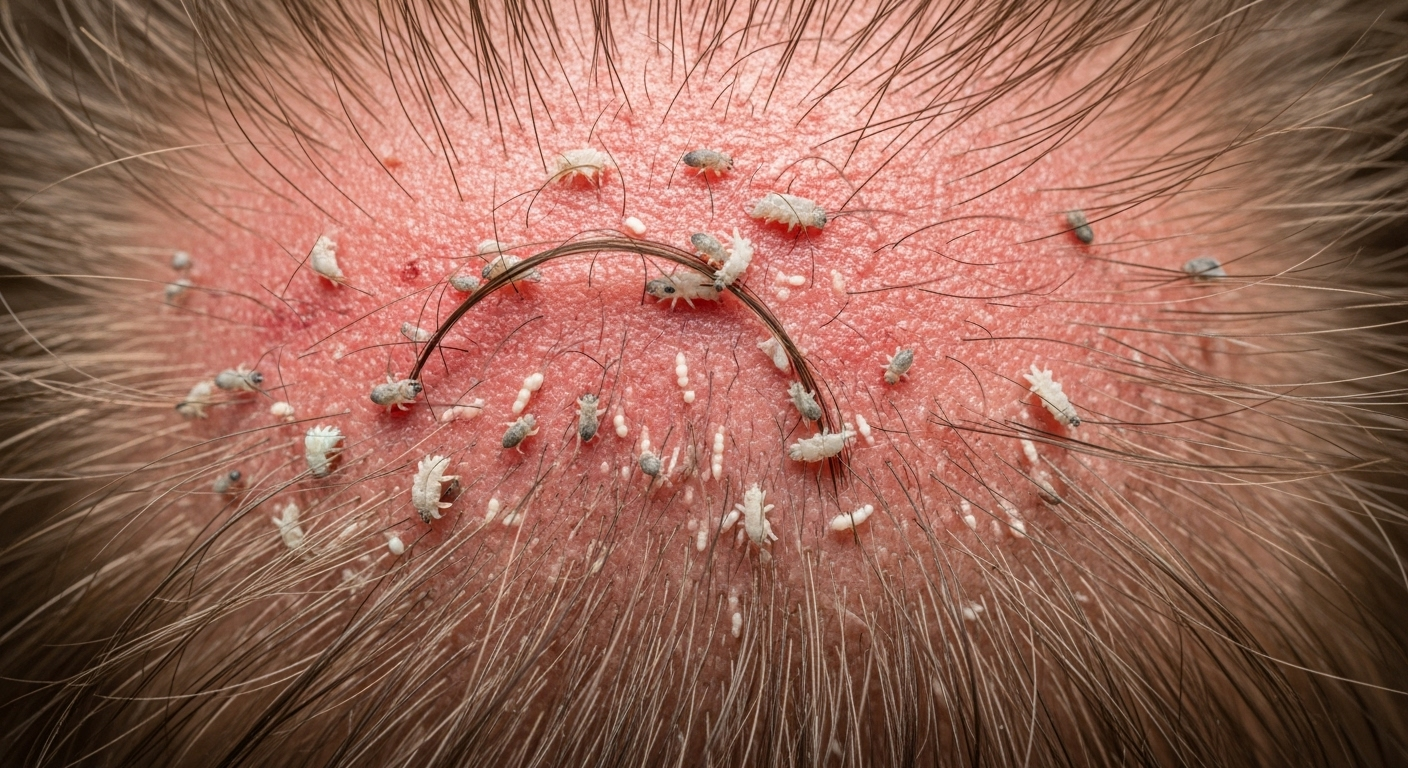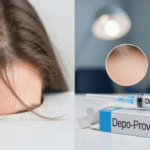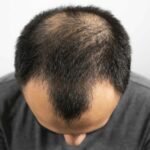Summary Lice don’t directly eat or destroy your hair, but they can indirectly cause lice hair loss through scratching, scalp irritation, and harsh treatments. While most hair grows back naturally once lice are eliminated, recovery depends on scalp health, infection risk, and proper care. Can Lice Cause Hair Loss? This article explores the science, expert-backed …
Summary
Lice don’t directly eat or destroy your hair, but they can indirectly cause lice hair loss through scratching, scalp irritation, and harsh treatments. While most hair grows back naturally once lice are eliminated, recovery depends on scalp health, infection risk, and proper care. Can Lice Cause Hair Loss? This article explores the science, expert-backed recovery timelines, safe treatments, and proven tips to restore strong, healthy hair.
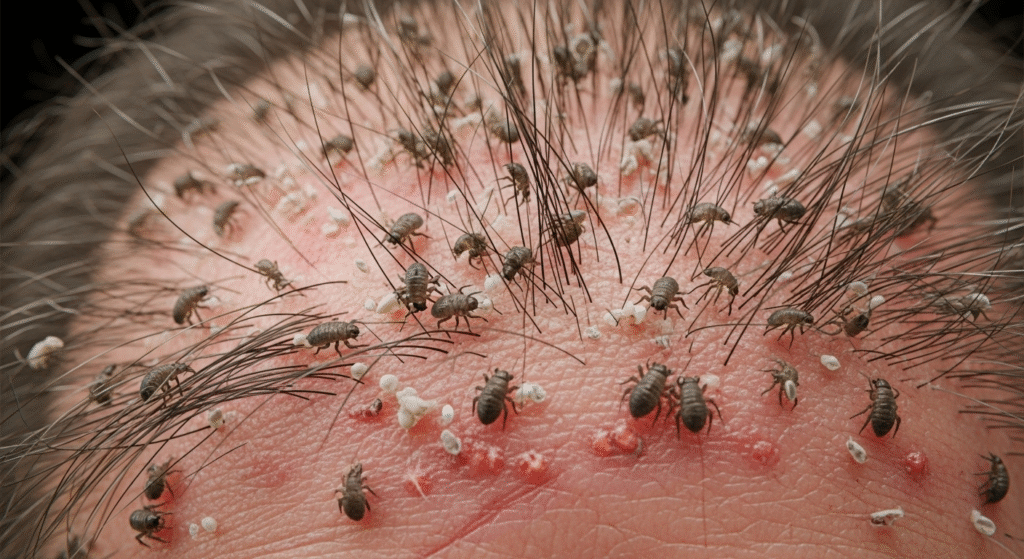
Table of Contents
Introduction
Are you worried about sudden hair thinning and wondering if lice could be the culprit? Lice hair loss is often misunderstood, with myths making it seem worse than it really is. In reality, lice don’t directly cause baldness, but constant scratching, scalp irritation, and even strong chemical treatments can lead to breakage and temporary loss. This article will help you understand the real connection, learn safe recovery steps, and regain trust in your hair’s ability to heal.
What Are Head Lice & How Do They Live?
Definition & Biology of Lice
Head lice (Pediculus humanus capitis) are tiny, wingless insects that live on the scalp. They feed on small amounts of blood and cling tightly to hair shafts using claw-like legs.
Life Cycle of Lice
Lice reproduce quickly. Females lay eggs (nits) close to the scalp, which hatch in 7–10 days. If left untreated, lice can spread rapidly within families and classrooms.
Symptoms of Infestation
- Persistent scalp itching
- Tiny red bumps from bites
- Visible lice or nits near the scalp
- Irritation and sores from scratching
Why People Assume Lice Cause Hair Loss
The “Itch and Scratch” Narrative
Constant scratching is the main reason people associate lice with hair loss. Continuous friction weakens hair strands and irritates follicles.
Myths and Misconceptions
- Myth: Lice eat hair.
- Truth: Lice feed on blood, not hair strands. Hair loss comes indirectly from scratching and inflammation.
What Science Says
Research shows lice rarely cause permanent damage. According to a PubMed case report, only severe, untreated infestations can lead to patchy alopecia in rare cases.
How Lice (Indirectly) Lead to Hair Loss or Damage
Scratching and Follicle Irritation
Aggressive scratching breaks hair at the scalp and can inflame follicles, slowing regrowth.
Breakage vs. True Shedding
Most “lice hair loss” is breakage, not shedding from the root. This means follicles remain intact and capable of regrowth.
Secondary Infections and Scarring
If scratching introduces bacteria, infections may scar follicles. This is rare but can lead to permanent bald patches.
Stress and Telogen Effluvium
The stress of infestation may trigger telogen effluvium, where hair prematurely shifts into the shedding phase.
Signs That Hair Loss Is from Lice (vs. Other Causes)
- Breakage near scalp vs. smooth shedding at roots
- Recent lice infestation followed by hair thinning
- Red bumps, sores, and visible nits
- Unlike alopecia areata, lice-related hair loss shows inflammation and broken strands rather than smooth bald patches
How to Treat Lice Without Worsening Hair Loss
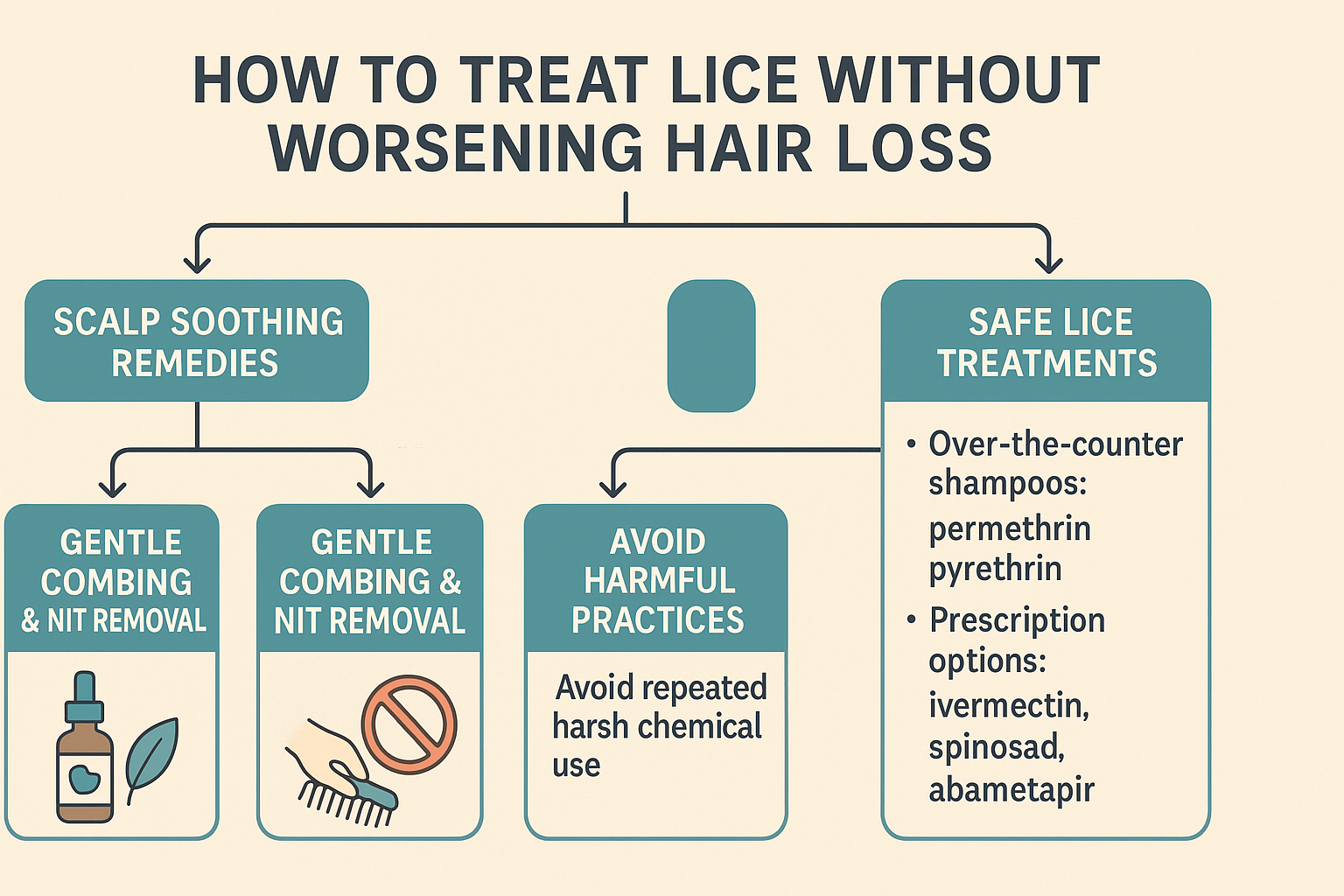
Safe Lice Treatments
- Over-the-counter shampoos: permethrin, pyrethrin
- Prescription options: ivermectin, spinosad, abametapir
- Avoid repeated harsh chemical use
Gentle Combing & Nit Removal
Use a fine-tooth lice comb on damp hair every 2–3 days for two weeks. Always detangle hair gently to prevent breakage.
Avoid Harmful Practices
- Over-washing hair
- Harsh oils or kerosene (dangerous and outdated)
- Tight hairstyles during treatment
Scalp Soothing Remedies
Mild aloe vera gel or dermatologist-recommended anti-inflammatory creams help calm irritation.
Recovery Timeline & Hair Regrowth Chart
Week-by-Week Expectations
- Week 1–2: Itching decreases after treatment, hair breakage stops
- Week 3–6: New growth visible, scalp heals
- 2–3 Months: Normal thickness usually restored
- 6+ Months: In rare cases of infection, regrowth may take longer
When to Worry
If bald spots persist beyond 3–4 months, consult a dermatologist.
Tips to Support Hair Regrowth After Lice
- Nutrition: Protein-rich diet, iron, zinc, vitamin D, and biotin
- Hair Care: Use mild shampoos, avoid heat styling
- Topical Treatments: Minoxidil (only if advised by doctor)
- Lifestyle: Stress reduction supports natural hair cycles
Pro Tip: Use silk pillowcases to reduce hair breakage during sleep.
When to Seek Professional Help & What to Expect
Prescription-strength treatments may be offered
Persistent bald patches
Scalp infections (oozing, redness, pain)
Dermoscopy or scalp biopsy may be done
FAQs:
Does lice cause hair loss or just breakage?
Mostly breakage. Hair loss from the root is uncommon.
How long does it take to regrow hair after lice?
Usually 1–3 months for normal thickness.
Will hair follicles be permanently damaged?
Rare, only if scarring infections occur.
Can lice treatments cause hair loss?
Yes, if used excessively or harshly. Prescription treatments are generally safer.
When should I see a doctor?
If bald patches remain after 3 months or infection signs appear.
Ready To Take Your Next Step
Worried about lice-related hair loss or thinning? Don’t leave your scalp health to chance. Book a consultation with Dr. Uzma Irfan in Islamabad today to get personalized guidance, safe treatment, and a recovery plan tailored to your hair.

